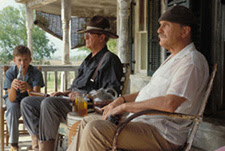Whew!
About an hour later, Luci (my dog, the quieter of the females in my house) and I walked the mile up to our church's community garden. This past weekend, my wife and I planted a couple of tomato plants and seeds for peas, beans, carrots, spinach and other foods that we don't like but that grow in the fall, and I was planning on watering.
But I took another look at the sky just to be sure it's not going to rain, and this is what I saw ... beautiful!
And with the same uncontrollable mind rush that delivered "first thing you know ol' Jed's a millionaire" to my daughter, Tennessee Ernie Ford's choir launches into:
He walks with me
And He talks with me
And He tells me I am his own
Ironically, that song is In the Garden, and I remember my dad playing Tennessee Ernie Ford's album and singing along (it's a great phrase for meditation, especially if you just happen to be in a garden watering vegetables).
So, what causes those "mind rushes?" What makes those memories stick.
Why can you say "three-hour tour" to someone my age -- many of us who can't even remember to pull our zippers up -- and we immediately break into the theme song from Gilligan's Island? Walk up to a baby boomer and say, "farm livin' is the life for me," and we're holding a pitchfork or driving an imaginary tractor, singing "Green Acres."
What makes words, phrases and ideas memorable? We were a TV generation, and those simple, story-telling theme songs burned forever in our brains. But how can contemporary writers deliver messages that have the same impact?
My daughter's Beverly Hillbillies horror reminded me of Made to Stick: Why Some Ideas Survive and Others
Die (Heath and Heath, 2007) that I reported on a few years ago.
It convincingly outlines the SUCCESs concept to making writing memorable. SUCCESs is the authors' acronym for the key elements to creating messages that "stick" with readers or listeners:
- Simple
- Unexpected
- Concrete
- Credible
- Emotional
- Stories
Authors Chip and Dan Heath immediately make their point in chapter one, "The Kidney Heist," telling the urban legend about a traveling salesman who meets a woman in a bar, invites her to his room, and then the next thing he remembers is waking up in a bathtub full of ice with stitches on the spot covering where his kidney should be.
Re-read or simply re-tell that story. Like so many urban legends and other stories, theme songs, commercials and movie scenes that have created our unique cultures, it has all the SUCCESs elements to make it memorable. Made to Stick is a must-read for any writer, but especially those writer charged with delivering convincing, persuasive messages to move publics to action.
Or for those writers who want to plague TV-watching fans long into middle age (and their children ... bwahahahahahaha) with ditties that never die, like my own personel nemeses Underdog, Batman and, of course, The Addams Family (snap, snap).
My dad loved to play his guitar and sing, and he especially liked country gospel and bluegrass music. I know I've posted this photo before, but it's one of my favorites, so just think of it as a bonus. Here's my dad:
Follow me on Twitter: @FWgib
Heath,
Chip and Dan Heath. Made to stick: why
some ideas survive and others die. New York: Random House, 2007.




